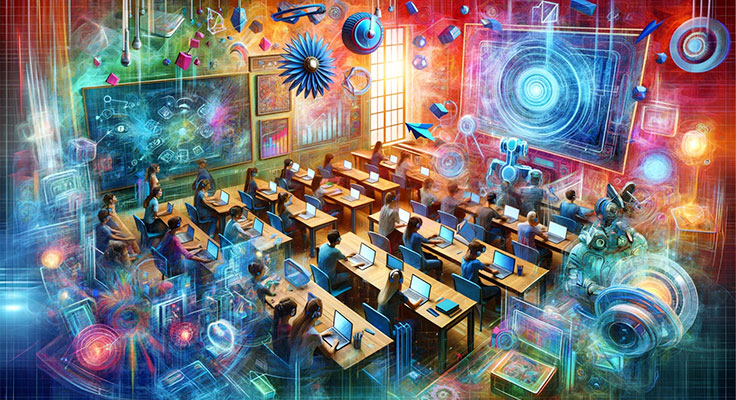
In the modern era, where technology infiltrates every aspect of our lives, its integration into the educational sphere has become a convenience and necessity. This comprehensive exploration discusses why technology is indispensable for enhancing students’ educational experience. By incorporating digital tools and resources, educators can create a more interactive, inclusive, and effective learning environment, equipping students with the necessary skills to thrive in the 21st century.
Enhanced Learning Experiences
Interactive and Engaging Learning
The integration of technology into education revolutionizes traditional teaching methodologies. Digital tools like interactive whiteboards, educational applications, and virtual reality experiences bring subjects to life, engaging students in a way that textbooks alone cannot. This interactive approach to learning fosters a deeper understanding of complex subjects, as students are more likely to retain information presented in a dynamic and engaging format. Furthermore, technology makes it possible to simulate real-world scenarios, allowing students to experiment and learn in a safe, controlled environment.
Personalized Learning Paths
One of the most significant advantages of technology in education is its ability to cater to individual learning needs. Adaptive learning software and educational platforms can customize the learning experience to match each student’s pace and style. This individualized approach ensures that students needing more time to grasp certain concepts are not left behind. At the same time, those who advance more quickly are continuously challenged. Moreover, immediate feedback provided by these technologies allows students to understand their mistakes and learn from them, fostering a growth mindset.
Access to a World of Information
Instant Access to Resources
In today’s educational landscape, the use of technology in learning environments is more critical than ever. The integration of technology in classrooms opens up a world of limitless information. Students can instantly access various resources, including up-to-date scholarly articles, interactive educational videos, and real-time global news.
This access enhances their learning experience and encourages them to become independent learners. Moreover, for those needing extra support in harnessing this vast array of information, you can get essay help on speedypaper.com. Students develop critical skills essential in academic and real-world settings by learning to research and discern reliable sources effectively.
Global Connectivity
Technology bridges geographical gaps, connecting students with peers and educators worldwide. Through online collaboration tools and educational platforms, students can participate in global projects, engage in cross-cultural exchanges, and gain a broader world perspective. This exposure is invaluable in cultivating global citizens who are empathetic, culturally aware, and prepared to work in an increasingly interconnected world.
Development of Essential Skills
Digital Literacy
In an age where digital proficiency is as crucial as traditional literacy, exposure to technology in the classroom is vital. Students learn not just how to use technology but also how to use it responsibly. Understanding digital safety, privacy, and etiquette is essential in today’s digital world. Moreover, as they navigate various platforms and tools, students develop comfort and familiarity with the technology necessary for their future educational and professional endeavors.
Critical Thinking and Problem-Solving
It’s fascinating to see how education has evolved with technology integration in today’s digital age. The learning landscape has been significantly reshaped, offering students new and interactive ways to acquire knowledge. You can check this article and learn how technology has changed education. You’ll learn that technology-enhanced learning often involves tasks that require critical thinking and problem-solving skills.
Educational games, coding exercises, and simulation-based learning platforms challenge students to apply their knowledge in practical scenarios. This approach makes learning more engaging and helps students develop essential life skills. They learn to approach problems methodically, analyze data, form hypotheses, and devise innovative solutions, preparing them for complex challenges they may face in their future careers.
Preparation for the Future Workforce
Career Readiness
The job market of the future will demand a workforce that is not only knowledgeable but also technologically adept. Integrating technology into the educational system ensures that students are familiar with various digital tools and platforms, a prerequisite in almost every career path today. By gaining hands-on experience with these technologies, students are better prepared for the demands of the modern workplace.
Encouraging Innovation and Creativity
Technology catalyzes creativity and innovation in the classroom. Students using digital tools for projects and assignments are encouraged to think creatively, exploring new ways of problem-solving and expression. This environment fosters a culture of innovation, where students are motivated to experiment and think outside the traditional confines of highly valued skills in many fields.
Improved Collaboration and Communication
Enhancing Teamwork
Modern technology offers an array of tools that facilitate collaborative learning. Platforms that enable document sharing, online discussion forums, and collaborative project tools mimic the collaborative environments they will encounter in the workplace. These experiences teach students the importance of teamwork, communication, and cooperation, skills crucial for success in both academic and professional environments.
Effective Communication
Digital platforms provide varied and effective ways of communication, ranging from emails to video conferencing. Exposure to these forms of communication helps students develop versatile communication skills. They learn to articulate their ideas clearly and effectively in different formats, an essential skill in a world where digital communication is prevalent.





Leave a Reply